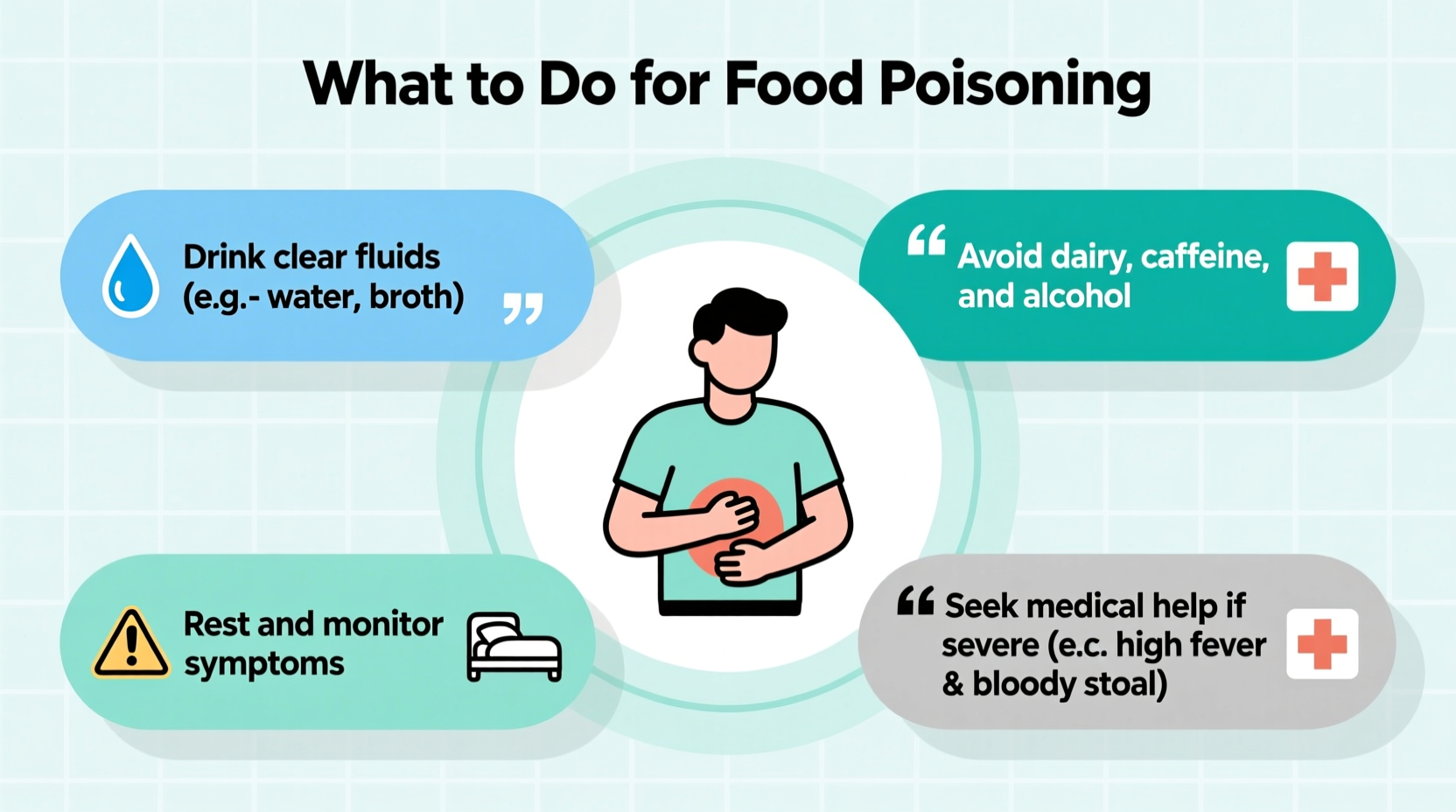Immediate Actions for Food Poisoning: First 24 Hours
When food poisoning strikes, your first actions determine recovery speed and severity. Stop eating solid foods immediately to give your digestive system a complete rest. During the initial vomiting phase, take small sips of clear fluids every 5-10 minutes rather than large amounts at once.
The Centers for Disease Control and Prevention (CDC) recommends oral rehydration solutions as the gold standard for replacing lost fluids and electrolytes. If unavailable, create a homemade solution with 4 cups water, 6 level teaspoons sugar, and 1/2 teaspoon salt. Avoid sports drinks which contain too much sugar that can worsen diarrhea.
| Fluid Type | Recommended? | Reason |
|---|---|---|
| Oral rehydration solutions | Yes | Perfect electrolyte balance for rapid absorption |
| Clear broth | Yes (after first 6 hours) | Provides sodium but lacks potassium |
| Sports drinks | No | Excess sugar worsens diarrhea |
| Caffeinated beverages | No | Dehydrating and irritates digestive tract |
During the first 6 hours, do not take anti-diarrheal medications like loperamide. Your body needs to eliminate the toxins causing your illness. Medications can trap harmful bacteria in your system, potentially worsening your condition. The Mayo Clinic emphasizes that allowing natural elimination is crucial during the acute phase.

Monitoring Symptoms and Warning Signs
Most food poisoning cases resolve within 1-3 days with proper home care. However, certain symptoms require immediate medical attention. The World Health Organization identifies these critical warning signs that indicate potentially serious complications:
- Bloody or black stool (indicating possible intestinal damage)
- Diarrhea lasting more than 3 days
- Fever above 102°F (38.9°C)
- Signs of severe dehydration: dizziness, rapid heartbeat, minimal urination
- Inability to keep fluids down for 12+ hours
High-risk populations including infants, elderly adults, pregnant women, and immunocompromised individuals should contact a healthcare provider at the first sign of food poisoning. The NHS reports that approximately 1 in 5 food poisoning cases in high-risk groups requires medical intervention due to faster dehydration progression.
Recovery Phase: Reintroducing Foods
As vomiting subsides (usually after 24 hours), gradually reintroduce bland foods using the BRAT diet (Bananas, Rice, Applesauce, Toast). These low-fiber foods are gentle on your recovering digestive system. Start with small portions every 2-3 hours, monitoring your body's response.
Avoid these foods during recovery:
- Fatty, fried, or spicy foods
- Dairy products (temporarily)
- High-fiber foods like raw vegetables
- Caffeine and alcohol
Full recovery typically takes 1-5 days depending on the causative agent. Norovirus usually resolves in 1-3 days while bacterial infections like salmonella may last 4-7 days. Complete digestive recovery often takes 1-2 weeks, during which you should continue eating bland foods and avoid heavily processed items.
Preventing Future Episodes
Understanding proper food handling prevents most food poisoning cases. Follow these evidence-based practices:
- Wash hands thoroughly before handling food and after using the bathroom
- Cook meats to proper internal temperatures (poultry: 165°F, ground meats: 160°F)
- Refrigerate leftovers within 2 hours (1 hour if temperature exceeds 90°F)
- Separate raw meats from ready-to-eat foods
- Wash produce under running water before consumption
The FDA's Food Code specifies that danger zone temperatures between 40°F and 140°F allow bacteria to multiply rapidly. Never leave perishable foods in this temperature range for more than 2 hours to significantly reduce food poisoning risk.
When Professional Help Is Necessary
While most cases resolve with home care, certain situations require medical intervention. Seek immediate care if you experience:
- Signs of severe dehydration: sunken eyes, dry mouth, no tears when crying, dizziness when standing
- Neurological symptoms like blurred vision or muscle weakness
- Recent travel to areas with poor sanitation
- Consumption of potentially contaminated wild mushrooms or seafood
Medical professionals may prescribe antibiotics for specific bacterial infections or administer intravenous fluids for severe dehydration. Do not attempt to self-treat serious cases, as proper diagnosis determines appropriate treatment.











 浙公网安备
33010002000092号
浙公网安备
33010002000092号 浙B2-20120091-4
浙B2-20120091-4